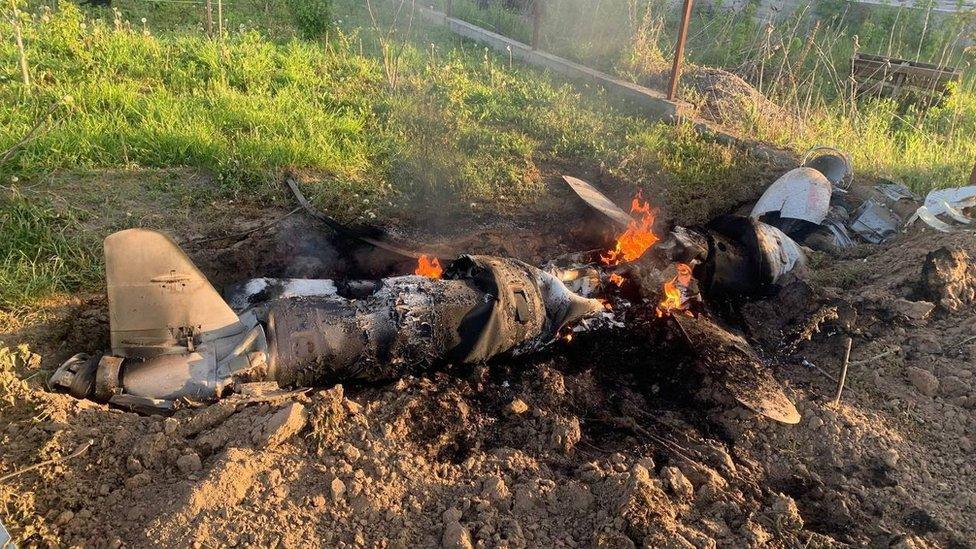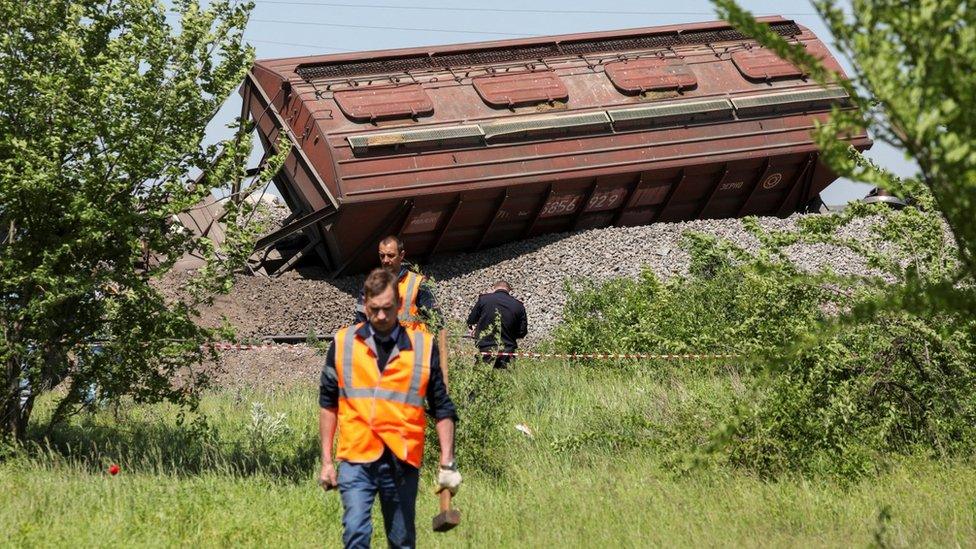Ukraine war: Russia launches ninth wave of missile attacks on Kyiv this month
- Published
- comments

Ukraine says one of the Russian missiles shot down over the Kyiv region fell in the backyard of a house
Ukraine's capital Kyiv has been attacked from the air by Russia for the ninth time this month.
Kyiv's authorities said it seemed all incoming missiles had been destroyed, but debris falling from the air caused some damage in two districts.
One person has been killed and two more wounded in a missile strike on the Black Sea port of Odesa, officials say.
Blasts were also heard in the central-western regions of Vinnytsia, Khmelnytsky and Zhytomyr.
Overall, 29 out of 30 missiles launched by Russia overnight were shot down, Ukraine's Air Force said in a statement.
Russia has significantly increased the frequency of its missile attacks on Ukraine over the past days and weeks, while Ukraine appears to be shooting down more of Russia's missiles.
So far in May, Russia has carried out four mass launches - two them between 16 and 18 May alone - compared to one each in April and March, and two in February.
The last time Russia attacked with such intensity was in the period after New Year, when four attacks took place in quick succession between 31 December and 26 January.

The train derailed near Simferopol on Thursday morning, Russian-appointed officials in Crimea say
In a separate development, rail traffic was suspended between Simferopol and the city of Sevastopol after a freight train carrying grain derailed. Simferopol is the regional capital of Ukraine's Crimea peninsula, which was annexed by Russia in 2014.
Vladimir Konstantinov, the Moscow-installed head of the regional parliament, told Russia's state media that the derailment was caused by an explosion. An investigation is now under way.
In the latest overnight attack on Kyiv, Russia used cruise missiles and reconnaissance drones, the capital's military administration said in a statement.
It said that "a series of air attacks on Kyiv, unprecedented in their power, intensity and variety, continues".
On Tuesday, Ukraine said it had shot down six Kinzhal hypersonic missiles as part of an "exceptionally dense" attack.
Speaking before the all-clear was given, Kyiv's Mayor Vitali Klitschko said a fire had broken out in a garage in the Darnytsya area of Kyiv, but added no one had been injured.
The head of Kyiv's civilian military administration said a heavy missile attack had been launched from Russian strategic bombers over the Caspian Sea.
Serhiy Popko said the attack probably included cruise missiles, adding that Russia had deployed reconnaissance drones over Kyiv after unleashing its wave of air strikes.
He said a second fire had broken out in a non-residential building in Kyiv's eastern Desnyansky district, but did not give an update on if anyone was hurt.
At least eight people were reportedly killed - including a five-year-old boy near Kherson - and 17 were injured by shelling on Wednesday, as both sides traded accusations of striking civilian areas.
Two adults and a five-year-old killed after Russian shell falls near playground
Slowly but surely Ukraine is getting ready to launch a huge assault on Russia's invading forces.
Western officials say Ukraine's army is at "an increased state of readiness" ahead of a long-awaited counter-offensive against Russia's invasion.
The officials said many of Kyiv's military capabilities were now "coming together" - including its ability to deploy tanks, fighting vehicles and combat engineers, as well as clearing mines, bridging rivers and striking long-range targets.
They said Russian troops were in a parlous state but warned that Moscow's defensive lines in Ukraine were "potentially formidable" and guarded by "extensive minefields".
So the officials argued the success of any Ukrainian offensive should be measured not just by territorial gains but also by whether it convinced Russian President Vladimir Putin to rethink his strategy.
The "cognitive effect on the Kremlin", they claimed, was more important than Ukrainian forces cleaving through Russian lines all the way to the border.
On Wednesday, Ukraine's Foreign Minister Dmytro Kuleba met with a Chinese diplomat in Kyiv and rejected any peace plan which would involve them giving up territory to Russia.
But an agreement allowing Ukraine to export millions of tonnes of grain through the Black Sea has been extended for two months, the day before it was due to expire.
Additional reporting by Adam Robinson

Related topics
- Published17 May 2023
